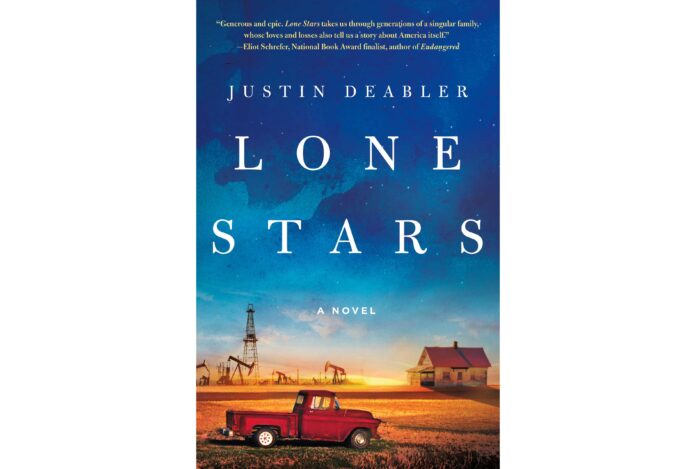Justin Deabler’s novel, “Lone Stars” is a phenomenal debut. The author writes what he knows — like his main character Julian Warner, he is a gay man from Houston who graduated from Harvard. He lives in Brooklyn, with his husband and son. But if “Lone Stars” is a roman à clef, that fact enhances, rather than detracts from the book’s power. This story, of four generations of a Texas family, is so vivid and engaging — and so well written — that it would be equally page-turning as a memoir.
The book opens with a corny prologue; Julian and his husband Philip are awakened by their adopted son Pedro’s crying. A glance at a children’s book about family prompts Philip to ask Julian what will you tell our son about your family? The question is triggering. As “Lone Stars” shows, Julian’s family was complicated. The novel then flashes back to recount the history of the Warners from the 1950s to the present.
It is a canny approach. But so too is Deabler’s storytelling. He creates 13 chapters, each one a mini-masterpiece, a jewel of a short story connected by characters whose lives overlap. Every chapter is set in a particular era, often identified by a single reference to something political, usually presidents, Eisenhower, LBJ, Clinton, and Obama all make appearances, but popular music and culture also dictate the times. This may be a device, but it works, because readers can fill in the blanks or gauge something about the characters changing in their responses to the times they live in.
The first chapter introduces Lacy, a young girl in McAllen, TX, who sees injustice and wants to right it. She has a domineering father and a mother who is half-Mexican but denies her heritage. There is privilege and a family secret that comes to light here, but mostly Deabler is getting readers to appreciate Lacy, who, almost 100 pages later, is revealed to be Julian’s mother.
Julian’s father, Aaron, is the subject of the next chapter. He is a smart but poor young man who has a domineering (and racist) father, who works cleaning carpets. Aaron is looking to escape his family and go off to college, but the third chapter of “Lone Stars” has Aaron in Vietnam. He and Lacy, who is in college herself and feeling alone, exchange letters. Their pen pal correspondence, which is gripping, leads them to meet and eventually marry.
The second part of the book chronicles the couple’s married life, which is not all happy families. Julian is born and is a bit of a genius. Lacy makes a few unwanted discoveries about Aaron that cause some marital strife. She takes a job teaching science at Julian’s high school. Julian, who is struggling with his sexuality as a pre-teen (and bullied in one scene) eventually joins the swim team — his parents force him to participate in sports. He falls for Ben, a gay boy in his class around the same time Julian, a master debater, joins a right wing public speakers club. (Ted Cruz is mentioned more than once.) Deabler contrives some real drama when the closeted Julian has to answer a question about homosexuality in a speech competition.
But “Lone Stars” overcomes any coincidence because it is so heartfelt and affecting. Readers will care about Julian, who possesses an upstanding character, and generally makes good decisions. He may be infatuated with Ben, but he will not let himself be taken advantage of by this horny classmate. Likewise, when Julian meets Philip at Harvard — at a gay alliance event in the next chapter — their romance is charming and initially chaste. The wealthy Philip tries to impress Julian on a date by taking him to a fancy bar. Julian, who watches every penny, asks him to show him the best dive in Cambridge. Even if the prologue indicates that they will end up married with a kid, there is a real pleasure in seeing how they get to know each other, smoking a joint on a rooftop rather, than using the condom burning a hole in Philip’s pocket.
“Lone Stars” allows readers to get to know all the characters well. Lacy is always formidable and sympathetic. She has some very touching moments alone or with Julian as he grows up and she grows older. Aaron is a bit of a villain — it may be a spoiler to reveal he has affairs — but Deabler shades his character with a pathos that humanizes, not demonizes him. Philip gets a few moments to shine, as do his parents, along with other supporting characters, like Lacy’s best friend Bonnie. They all have an impact on the central narrative and never come across as caricatures.
This is Deabler’s magic as a writer. Even if his observations about race and class and sexuality can feel forced at times, “Lone Stars” hooks readers. As the story ebbs and flows through the lives of its characters, readers may find themselves crying after someone dies. This book makes one feel like part of the extended family.

